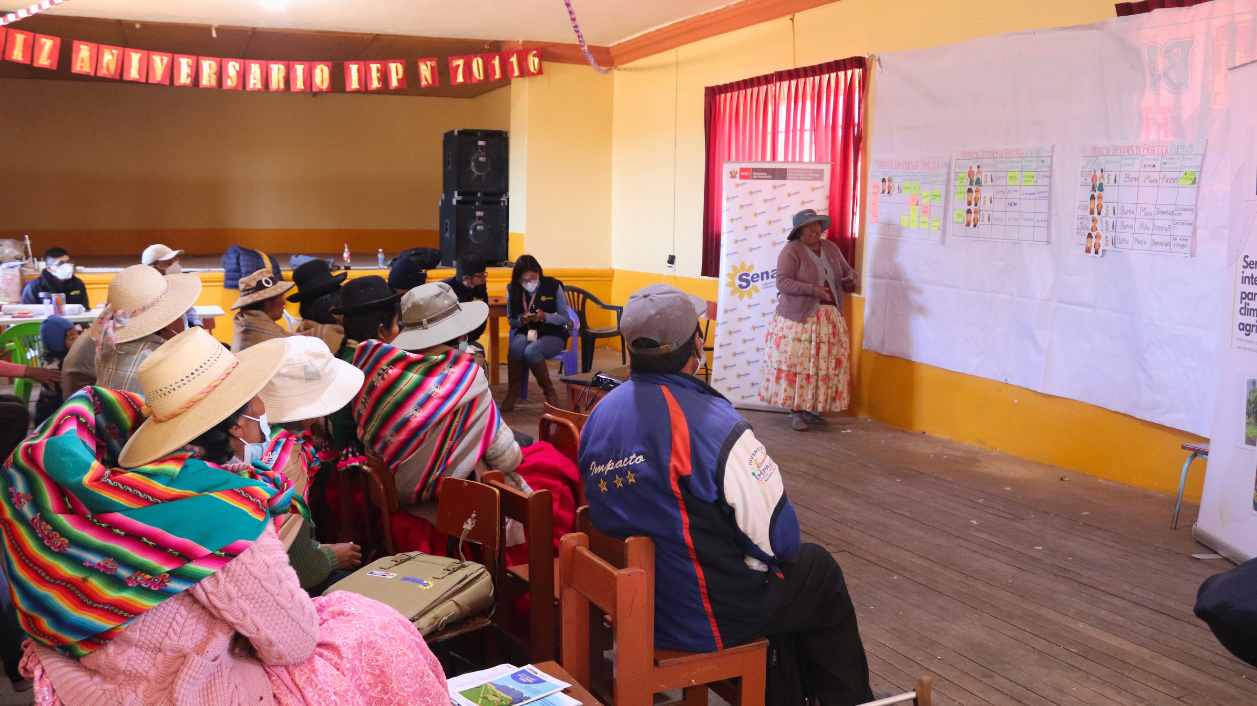“El Niño” is knocking on our door: How can climate information help vulnerable populations make better decisions to protect themselves from its impacts?

This text is based on the Climate Story titled ‘A local agroclimatic governance space: PGA in Ácora, Puno’ which was originally published on the Andes Resilientes website. Please access the original text for more detail.
Introduction
Puno is one of the most vulnerable Andean regions in Peru to climate variability and climate change (prolonged droughts, frosts, hailstorms, and extreme low temperatures) that affect agriculture and livestock throughout the region, mainly in rural areas.
Family farmers need information and practices that help them adapt their productive activities to such climatic events and to reduce risks. This is increasinly urgent with the predicted impacts of a new “El Niño” (ENSO) intensifying the conditions of water scarcity in the Andes during the period 2023-2024.
Agroclimatic Management Platforms
As part of the National Competitiveness and Productivity Plan, the Ministry of Rural Development and Irrigation (MIDAGRI), together with the Ministry of the Environment (MINAM) of Peru, have been promoting the creation of Agroclimatic Management Platforms (PGA for its Spanish name) throughout the country.
PGA are local governance spaces that give voice to small farmers, they are public entities that generate climate and agroclimatic information, and technical assistance services providers. Their objective is to promote and support the use of hydrological, meteorological, and agricultural information in productive decision-making, as well as the adoption of actions to reduce climatic risks in crops and breeding. To date, there are two PGA in Peru, and it is expected to grow to12 platforms by 2030 nationally.
Due to the high variability of climatic conditions and subsistence conditions of family farming in Puno, the second PGA was formed in 2021 in the district of Ácora. The articulation between various national and local stakeholders to develop this initiative was supported by the regional project Andes Resilientes al Cambio Climático, facilitated by the Helvetas-Fundación Avina consortium with financing from COSUDE. The PGA helped reinforce a local governance scheme, highlight the information needs of the most vulnerable family farmers, strengthen the links between ancestral and modern knowledge, and support the generation of collective actions between different groups of actors, and different intercultural mechanisms for dissemination and understanding of agroclimatic information.
The Andes Resilientes project promotes inclusive adaptation, which makes visible and meets the needs of the poorest and most vulnerable rural populations in the Andes in Bolivia, Ecuador and Peru. It does this through sensitive public policies that give rural populations access to information services, capacity building, technical assistance and financing, among others, to adapt their production practices and make them climate resilient. To achieve this, it works with the ministries of environment, agriculture, and social inclusion, subnational and local governments, promoting the articulation of their actions and the improvement of their services to support the resilience and adaptation of said populations.
In the case of the PGA Ácora specifically, the implementation has been carried out by the National Meteorology and Hydrology Service (SENAMHI) office in Puno, MIDAGRI local agencies, the Regional Government of Puno and the Municipality of Ácora. The PGA has been helping the local population to strengthen their climate resilience.
Climate stories
Below you can find testimonies of two members of the participating communities:
Luzmila Mendoza is a merchant farmer and is a participant of the PGA Ácora. She notes that climate change is significantly affecting her work. “The Platform tells us when there will be frost or winds. They have trained us through the PGA about how we should take care of our crops,” he says. See this video to hear Luzmila’s full testimony (in Spanish):
Adolfo Arohuanca is a merchant cattle farmer, also a very active participant of the PGA Ácora. He says he’s worried about the weather. “There is no rain, it is quite frosty and our animals are eating dry fodder,” he explains. Regarding the PGA, he comments: “The platform sends us WhatsApp messages, which helps us prevent the loss of crops. We also communicate among community members”. You can find his complete testimony below(in Spanish):
For more information on this activity you can access the climate story “A space for local agroclimatic governance in Peru” on the Andes Resilientes project’s website.
Related resources
- Climate-Smart Land Use Insight Brief No. 3- Climate services to support adaptation and livelihoods
- Current state of climate change policies and adaptation strategies in the Andes: A multi-sectoral view from the mountains
- Principles for Co-Producing Climate Services: Practical Insights from FRACTAL
- Climate Models: What They Show Us and How They Can Be Used in Planning
- Enabling Climate Science Use to Better Support Resilience and Adaptation Practice
(0) Comments
There is no content